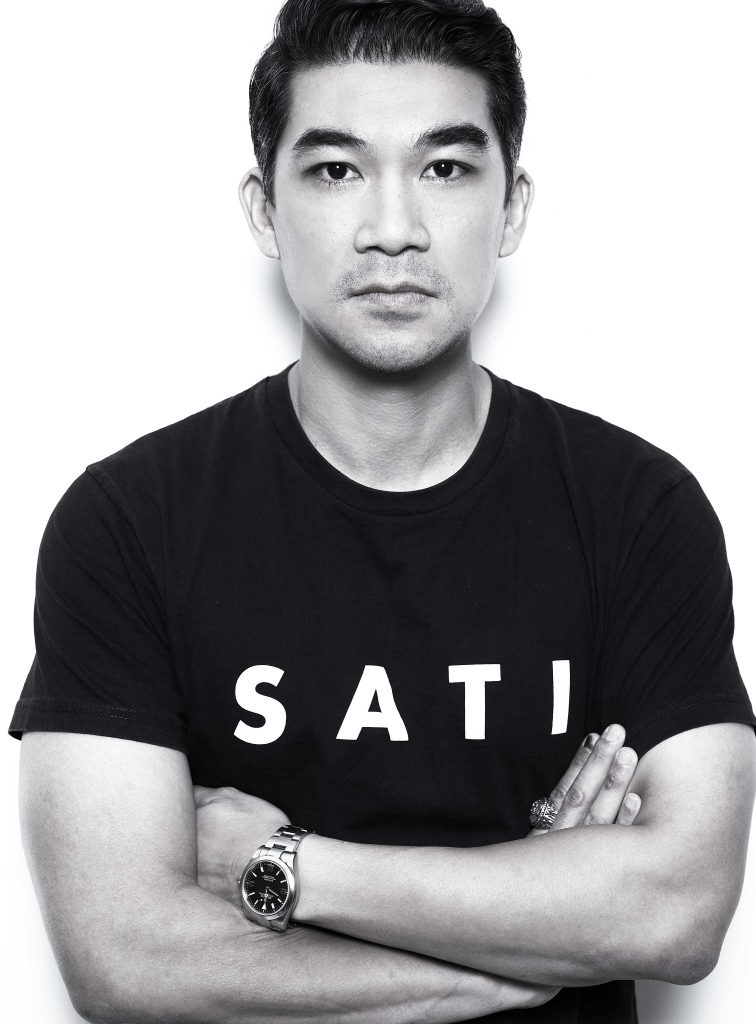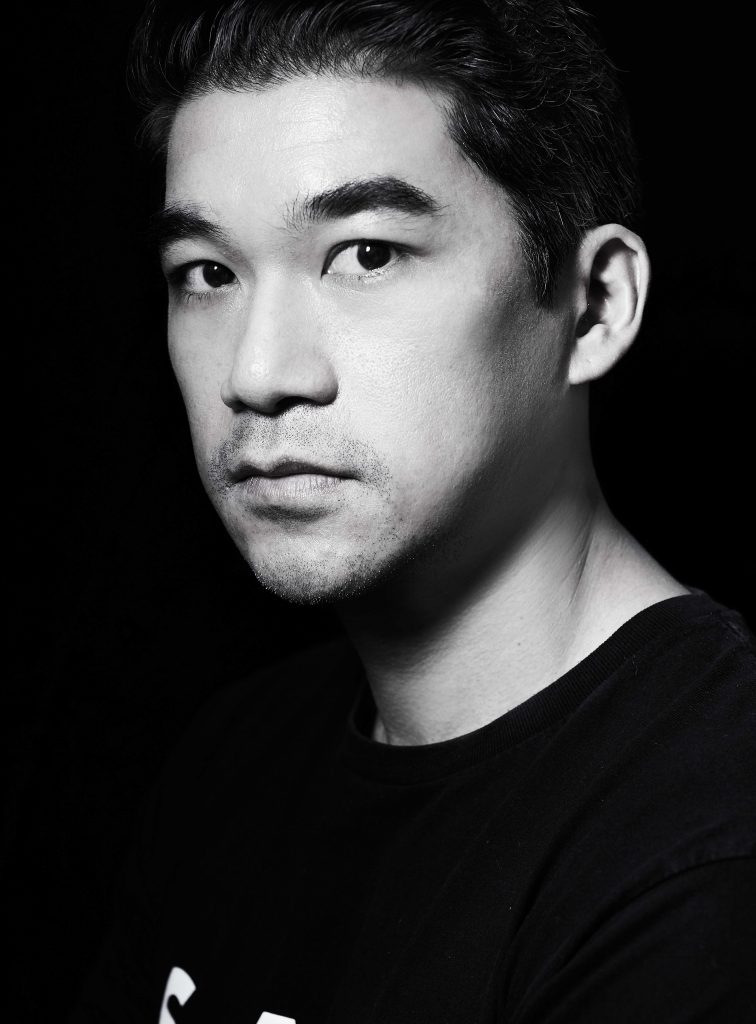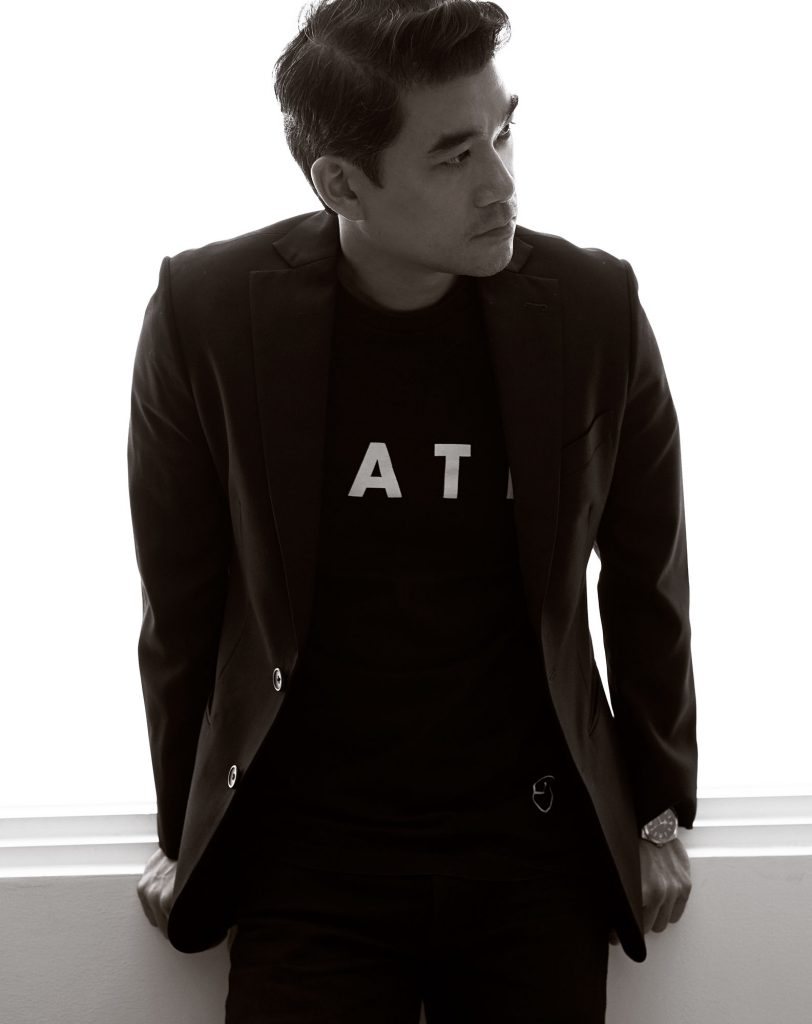Home / News / S for Sakson & SATI
S for Sakson & SATI
June 18, 2019

A MINDFUL AND THOROUGH EXAMINATION OF LIFE’S MANY FACETS.
สำรวจลึกลงไปในหลากหลายแง่มุมของชีวิตอันมีคุณค่าอย่างถี่ถ้วน ลึกซึ่ง ด้วยสติ
Pendulum ได้รับโอกาสพูดคุยกับคุณเสกสรร รวยพิรมณ์ (Sakson Rouypirom) หรือคุณเกรท ชายหนุ่มผู้ก่อตั้งมูลนิธิสติ หรือ SATI Foundation และหนึ่งในเจ้าของร้านอาหารวีแกน Broccoli Revolution และ คาเฟ่เปิดใหม่อย่าง Na café ที่มีคอนเซ็ปต์น่าสนใจพร้อมแนวคิดในการแบ่งปันส่งต่อความช่วยเหลือจากจุดเริ่มต้นเล็กๆ ให้กับเด็กด้อยโอกาสในรูปแบบต่างๆ ทั้งการสอนเด็กปลูกเห็ดและรับซื้อกลับมาทำอาหาร ไปจนถึงการเปิดโอกาสให้เด็กมาฝึกงานสร้างทักษะพัฒนาให้เกิดอาชีพต่อไปในอนาคต คุณแซ็คเกิดและเติบโตใช้ชีวิตส่วนใหญ่ที่สหรัฐอเมริกาจนเรียนจบปริญญาโทด้านจิตวิทยาและแพทยศาสตร์ จาก New York University และกลับมาทำมูลนิธิ รวมถึงธุรกิจร้านอาหารที่ประเทศไทย “ตอนเด็กๆคุณพ่อคุณแม่จะสอนเราเสมอว่าต้องช่วยเหลือผู้อื่น และสังคม ตอนนั้นเราก็คิดแค่ว่าถ้าจะช่วยคนได้ทางเลือกเดียวคือเราต้องเป็นหมอ เราจิตนาการภาพการเป็นหมอที่ได้เดินเข้าป่าไปช่วยคนในชุมชนห่างไกลในแหล่งธุรกันดาล แต่พอเราโตขึ้นได้ฝึกงานหลากหลายรูปแบบทั้งที่โรงพยาบาลเด็กในแผนกผู้ติดเชิ้อ HIV ที่บ้านเด็กกำพร้า ที่มูลนิธิช่วยเหลือเด็กไร้บ้านในอเมริกา รวมถึงการเป็นอาสาสมัครเข้าไปยังชุมชนแออัดในประเทศไทย ทำให้เราเห็นภาพในมุมที่กว้างขึ้นทั้งเรื่องของปัญหา และการช่วยเหลือ” คุณเกรท เล่าถึงที่มาและจุดเริ่มต้นที่นำมาสู่การก่อตั้งมูลนิธิสติในปี 2012 โดยปัจจุบันสำหรับมูลนิธิสตินั้นเน้นให้การช่วยเหลือด้านการศึกษาและสุขภาพอนามัยกับเด็กในประเทศไทยซึ่งแบ่งเป็นสองกลุ่มหลักๆ คือ เด็กในกรุงเทพบริเวณหัวลำโพง และเด็กต่างจังหวัดซึ่งตอนนี้ส่วนใหญ่เป็นเด็กทางภาคเหนือ “ผมพยายามแยกออกเป็นสองกลุ่ม กลุ่มแรกเป็นเด็กกรุงเทพซึ่งเป็นกลุ่มเสี่ยงที่มีแนวโน้มที่จะเข้าไปเกี่ยวข้องกับยาเสพติดและโรคติดต่อ รวมถึงการขายบริการ สติทำคลินิกอาทิตย์ละวันที่หัวลำโพง เป็นศูนย์อนามัยพื้นฐาน มีที่นอนและอาหารให้ทาน นอกจากนี้ก็มีการเปิดการเรียนการสอนหลักสูตร กศน. อาทิตย์ละ 2 วัน สติจะเข้าไปเพื่อดูแลเรื่องสุขภาพทั้งทางด้านร่างกายและจิตใจ ตัวอย่างเช่น การสอนให้นมบุตร และการช่วยเหลือเด็กที่เกี่ยวข้องกับสิ่งผิดกฎหมายและถูกทำร้ายมา เราต้องพูดคุย รับฟัง ชี้แนวทาง และเสนอทางเลือกในการใช้ชีวิตหาเลี้ยงชีพ ส่วนกลุ่มที่สอง คือ เด็กต่างจังหวัด ซึ่งจะเป็นเด็กที่ขาดโอกาสในอีกรูปแบบ หัวข้อที่เราสอนก็จะแตกต่างจากที่กรุงเทพ ส่วนมากจะเป็นเด็กดอยที่อยู่ห่างไกล ขาดแคลนเรื่องอาหารและความรู้ด้านสุขอนามัย โดยเราก็จะสอนเรื่องโภชนาการอาหาร บางทีก็จะมีเชฟขึ้นไปสอนด้วย สอนเรื่องอนามัยอย่างการล้างมือ สอนเรื่องความคิดสร้างสรรค์อย่างการถ่ายรูปเพื่อสร้างความฝัน แรงบันดาลใจ และอาชีพให้เด็ก ผมไม่ได้คิดว่าการทำนามันผิด แต่บางครั้งเขาคิดว่านั่นคือทางเลือกเดียวของเขา เราอยากสร้างทางเลือกครับ” คุณเกรทอธิบาย และยังเล่าอีกว่าเหตุผลที่แบ่งเด็กออกเป็นสองกลุ่มนั้นเเพราะปัญหาต่างๆ มันมีต้นเหตุและปลายเหตุที่แตกต่างกัน อย่างเด็กที่หนีออกจากบ้านเป็นเด็กต่างจังหวัด เด็กที่อยู่ที่กรุงเทพผ่านจุดนั้นมาแล้ว จึงต้องทำความเข้าใจเด็กตั้งแต่ก่อนและหลังจากหนีออกจากบ้านเพราะมันเป็นการแก้ปัญหาคนละแบบกัน “เด็กที่หัวลำโพงนั้นส่วนใหญ่ก็คือเด็กต่างจังหวัดที่นั่งรถไฟเข้ามา บางครั้งสามารถสังเกตได้ว่าเด็กคนนั้นมีปัญหาอะไรแบบไหนมาอยู่ก่อน ไม่ใช่รอให้เขาไปติดยาแล้วค่อยเข้าไปช่วยเหลือ เราต้องป้องกันกันไว้ก่อนเลย ด้านสุขภาพก็เน้นไปที่ preventive medicine หรือเวชศาสตร์ป้องกัน คือ การให้ความรู้และส่งเสริมให้รักษาสุขภาพจากต้นเหตุ เพื่อเป็นการป้องกันตนเอง ไม่จำเป็นต้องใช้แต่ยาในการรักษาซึ่งเป็นการจัดการที่ปลายเหตุอย่างเดียว” คุณเกรทเสริม
Pendulum would like to introduce you to Khun Sakson Rouypirom or Khun Great, the man behind SATI Foundation and co-owner of plant-based restaurant chain Broccoli Revolution, creative social space “CASE space” which exhibits work both from local artist as well as artists who have gone through SATI’s art therapy program. Also a brand new concept, creative social impact café called ‘Na café’ at Bangkok 1899. With a focus on meshing creativity, social impact, and low carbon practices, this café also provide workshops and vocational training to both students of SATI as well as urban refugees. Khun Great was born and spent his formative years in the US, obtaining his master’s degree in Psychology and a Medical degree from New York University. He returned to Thailand to start a foundation and eventually the restaurant business. “When I was young, my parents taught me always to help other people and to contribute positively to society. I thought the only option was to become a doctor. The picture I had in my head was a country doctor, trekking through the jungle to reach cut-off villages. But having had the chance to intern at various places, including the HIV ward in a pediatric hospital, an orphanage, a foundation for orphans in the US, and as a volunteer in the overcrowded slums in Thailand, my eyes were opened to the scale of the problem and the inadequacy of our response to it,” said Khun Great of the circumstances that led to his founding of SATI Foundation in 2012. Today, the foundation concentrates its activities on education and health initiatives for two major groups of underprivileged children, one around Hua Lampong and the other primarily in the north of Thailand. “The first group is children at risk of becoming involved in drugs or sex work, which can lead to communicable diseases. We run a weekly pop up clinic at a center that provides shelter and food for at risk youth and community kids. Two days a week we hold classes based on the curriculum approved by the Office of the Non-Formal and Informal Education. Our aim is to assess and improve both physical and mental health, and that can mean teaching them about breastfeeding to counseling for children that have been abused. We listen, we explain, we advise, and we offer them ways to make an honest living. The second group have different needs, so our classes are geared towards educating them about nutrition and health. Sometimes we’ll bring a chef, other times we’ll teach them how to wash their hands properly or have photography lessons that allow them to wonder, to be creative, to dream – and may be it can become a career. I’m not saying there is anything wrong with farming or agriculture, but often these children don’t even know that there are other options. We want to show them the possibilities,” said Khun Great. He further explained the logic of having two groups is because the root cause of the problems is fundamentally different. Most children that run away from home are from the provinces, while the children in Bangkok have already passed that stage. It is important to understand their mindset at each stage because they require different solutions. “The children at Hua Lampong, they’ve typically taken the train into Bangkok. Sometimes we can tell what they’ve been through and can offer help before they get involved in other troubles, which is always better. In terms of healthcare, our approach is preventive medicine, which aims are to protect, promote, and maintain health and well-being and to prevent disease rather than prescribing medicine after the fact,” he said.

การสัมภาษณ์พูดคุยกับคุณเกรทนั้นทำให้เราได้รับรู้ถึงปัญหาต่างๆมากมายในสังคมที่หลายคนอาจหลงลืมหรือมองข้ามไปซึ่งทั้งหมดล้วนต้องอาศัยทั้งเวลา ความเข้าใจ และความทุ่มเทในการจัดการแก้ไข โดยในการทำงานที่มูลนิธิของคุณเกรทนั้นเราอยากทราบว่ามีอุปสรรคและความท่าทายอะไรบ้าง รวมถึงการได้รับความช่วยเหลือต่างๆว่ามีมากน้อยอย่างไร “เรื่องที่ยากและท่าทายที่สุดคือการจัดการกับคนครับ ซึ่งนี้เป็นสิ่งที่ผมต้องเผชิญหน้าอยู่ทุกๆวัน คนเป็นปัจจัยที่คาดเดาไม่ได้ ไม่เหมือนวิชาเลขที่หนึ่งบวกหนึ่งเท่ากับสอง และคนที่ว่านั้นเป็นทั้งเด็ก ทั้งวัยรุ่น ซึ่งมีพื้นฐานทางบ้านที่แตกต่างกัน และยังมีสิ่งแวดล้อมในโลกปัจจุบันที่คอยดึงพวกเขาไปในทางที่ผิดอีก ส่วนเรื่องความช่วยเหลือที่เราได้รับนั้นผมว่าเป็นความโชคดีที่สตินั้นเป็นองค์กรเล็กๆ แต่มีคนทั้งใกล้และไกลตัวให้ความสนใจและให้การสนับสนุน ผมคิดว่าเราไม่ควรจะขอน้อยหรือมากไปกว่านี้ ปัญหาที่มีอยู่ตรงหน้าผมก็จะนำมาเทียบกับกำลังที่เรามีและพยายามประเมินจัดการมันอย่างเหมาะสม ซึ่งมันอาจจะดีหรือแย่ไปกว่านี้ก็ย่อมเป็นไปได้ แต่ผมถือว่ากำลังเรามีแค่ไหนเราก็ทำแค่นั้น ถ้าอนาคตเรามีกำลังมากขึ้น มีคนบริจาคเพิ่มขึ้น เราก็อาจจะได้ช่วยคนมากขึ้น แต่สมมุติว่าเราช่วยอยู่ 10 คน แล้วพรุ่งนี้ได้เงินบริจาค 10 ล้าน ก็ไม่ได้หมายความว่าผมจะเพิ่มจำนวนให้เป็น 20 คน หรือ 100 คน เราต้องเริ่มต้นจากการช่วย 10 คนนี้ให้ดีที่สุดก่อนแล้วค่อยเพิ่ม เพราะผมคิดว่าจำนวนมันไม่ใช่สิ่งสำคัญ เรื่องนี้มันก็เกี่ยวกับการบริหารด้วยส่วนหนึ่งครับ” คุณเกรทตอบ ตอนนี้มูลนิธิสติให้การช่วยเด็กในกรุงเทพจำนวนหลักร้อยคน ซึ่งมีการเข้าออกหมุนเวียนกันไป และช่วยเหลือเด็กในต่างจังหวัดจำนวนหลักพันคน ซึ่งปัจจุบันเน้นที่เชียงรายกับแม่ฮ่องสอน “เหตุผลที่เป็นสองจังหวัดนี้ก่อนส่วนหนึ่งเพราะความบังเอิญกับโอกาสที่เข้ามา เริ่มต้นที่เชียงรายเมื่อ 6-7 ปีก่อน ผมได้ไปเที่ยวและได้พบกับพี่คนท้องถิ่นคนหนึ่งที่ช่วยชี้ให้เห็นถึงที่มาของปัญหาต่างๆ และยังแนะนำให้ผมได้รู้จักกับอาจารย์ในโรงเรียนห่างไกล ด้วยเชียงรายเป็นหนึ่งในจังหวัดที่เดินทางลำบากเข้าถึงได้ยากที่สุดในประเทศไทย ผมเลยขอความช่วยเหลือไปยัง Unicef ซึ่งเป็นมูลนิธิขนาดใหญ่ให้เข้ามาแนะนำและช่วยติดต่อประสานงานต่างๆ ส่วนที่แม่ฮ่องสอนนั้นเราเพิ่งเริ่มได้ประมาณปีกว่า ในแม่ฮ่องสอนจะแบ่งเป็น 5 จุด แต่ละจุดจะมีโรงเรียนประมาณ 5-6 โรงเรียนที่เรียกว่า ‘โรงเรียนขยายโอกาส’ ซึ่งล้วนเป็นโรงเรียนที่มีเส้นทางเข้าออกลำบาก โดยทั้ง 5 โรงเรียนนี้จะมี ผอ. แค่ 1 คน Unicef ได้ช่วยติดต่อ ผอ. ทุกท่านเพื่อมาร่วมประชุมพูดคุยกับผมถึงปัญหา และการสร้างแนวทางในการแก้ไขอย่างเป็นขั้นตอน เราวางแผนการทำงานแบบระยะยาว ถ้าเราไม่ทำอย่างนั้นจะกลายเป็นการเอาของไปแจกแล้วจบ นี่คือสิ่งที่สติแอนตี้ที่สุด นอกจากการเอาสิ่งของไปแจกแล้ว เราต้องมีความรู้ติดไปแจกด้วย และยังต้องวางแผนต่อ อย่างเช่นครั้งนี้สอนเรื่องสุขอนามัย ครั้งหน้าเราก็จะสอนเรื่องการตั้งครรภ์การคุมกำเนิด ไปจนถึงเรื่องระบบชลประทาน หรือเรื่องการใช้คอมพิวเตอร์ ผมมีแพลนที่ทำ 50, 60 หรือ100 ปี แบบระยะยาว ซึ่งต้องค่อยๆทำไปเรื่อยๆ” คุณเกรทเล่า ถึงตอนนี้เป็นเวลากว่า 7 ปีที่คุณเกรทได้พบเจอกับเรื่องราวปัญหาของเด็กมากมายหลายร้อยหลายพันคนมีเคสไหนไหมที่ถือเป็นประสบการณ์ครั้งสำคัญในชีวิต “ผมอยากเล่าถึงเหตุการณ์หนึ่งซึ่งเป็นเรื่องที่ไม่ดี แต่สิ่งที่ผมได้มาเราไม่รู้ว่ามันเป็นสิ่งที่ดีหรือไม่ดีกันแน่ ที่คลินิกหัวลำโพงมันจะมีเรื่องหลากหลายตั้งแต่โรคติดต่อ ไปถึงยาเสพติด เมื่อสองปีที่แล้วมีเด็กผู้หญิงขายบริการอายุ 16 ปีที่กำลังตั้งท้องเข้ามาหาผม ตอนนั้นเขาทั้งเสพยา สูบบุหรี่ ไม่ได้ฝากท้อง ผมบอกเขาว่ามนุษย์มีสิทธิ์ในการทำร้ายตัวเองได้ แต่การที่คุณทำร้ายคนอื่นมันผิด ผมจึงพาเขาไปโรงพยาบาล แล้วหลังจากนั้นเด็กก็หายตัวไป ผ่านไปหลายเดือนเขาก็กลับอีกครั้งพร้อมอุ้มเด็กผู้ชายอายุ 5 เดือนมาด้วย เด็กคนนี้เป็นเด็กที่ผมรู้สึกว่าคือ ‘ความมหัศจรรย์’ ผมอุ้มเขาและเขาหัวเราะ ยิ้มอยู่ตลอด มันเป็นพลังงานบวกมากๆ เพราะผมเห็นหลายคนพยายามทำทุกอย่างที่ถูกที่ควรแต่ก็ไม่มีลูก ในขณะที่เด็กผู้หญิงคนนี้ทำทุกอย่างที่ผิด แต่ยังสามารถให้กำเนิดทารกที่ไม่มีความผิดปกติใดใดเลย มันเหมือนกับปาฏิหาริย์ ตอนนั้นผมเลยบอกว่ายังไงก็จะไม่ให้เด็กอยู่กับแม่ เพราะเขายังทำตัวเหมือนเดิม ทั้งเสพยาและขายบริการ ไม่ว่าจะไปอยู่กับผมหรือบ้านเด็กกำพร้าก็ได้ ซึ่งการทำเรื่องต้องใช้เวลาประมาณหนึ่งเดือน ผมก็ขึ้นไปทำงานต่อที่แม่ฮ่องสอน แล้วไม่นานก็มีคนโทรมาแจ้งว่าเด็กเสียชีวิตแล้ว เพราะแม่เด็กไปมีแฟนใหม่ที่ติดยาเหมือนกัน วันหนึ่งเด็กนอนร้องไห้ เขาเอาหมอนทับและนอนทับเด็กผู้ชายคนนี้จนตาย และเอาไปทิ้งในขยะที่ห้วยขวาง และที่ศพก็ยังมีรอยบุหรี่เต็มบริเวณขา เหตุการณ์ครั้งนี้เหมือนเราพบกับปาฏิหาริย์มาและถูกกระชากไปอย่างรุนแรงฉับพลัน ผมฟีลขาดไปถึงสองอาทิตย์ นอนไม่หลับ แต่พอคิดได้ก็เข้าใจว่าถึงเขาอยู่ไปก็อาจจะแย่กว่านั้นเพราะต้องเจอบุหรี่ทุกวัน ต้องอยู่ในสภาพแบบนั้น มันทำให้เราเข้าใจว่า ไม่ใช่ว่าสิ่งที่เราทำไปมันไม่พอหรือช่วยอะไรใครไม่ได้ เราแค่ต้องหาวิธีเปลี่ยนสังคมซึ่งผมก็ยังไม่รู้คำตอบหรอก แต่ผมเชื่อว่าเราต้องสร้างคำถาม เพราะถ้าเราไม่สร้างคำถาม เราก็จะไม่เริ่มหาคำตอบ ผมต้องการให้มีอะไรเปลี่ยนแปลง ผมไม่ต้องการให้มีเหตุการณ์แบบนี้เกิดขึ้นอีก ผมบอกกับตัวเองไม่ให้ยอมแพ้ล้มเลิกในสิ่งที่พยายามทำมานาน นี้ถือว่าเป็น turning point เป็นจุดเปลี่ยนสำคัญในชีวิตของผมเลย เป็นเหตุการณ์ที่ทำให้มีพลังมากขึ้น ก็เลยไม่รู้ว่าสรุปแล้วเรื่องนี้เป็นเรื่องดีหรือไม่ดี ซึ่งคำถามว่าดีหรือไม่ดีจึงแล้วแต่มุมมอง เด็กชายคนนี้จะได้ไม่ต้องทนอยู่กับคนที่ไม่ดี เด็กอาจจะดีเกินไปก็ได้ ขอให้เด็กได้ไปเกิดใหม่ไปมีชีวิตที่ดีขึ้น นี่อาจจะเป็นเรื่องที่แรงไปหน่อยแต่ว่ามันก็เป็นเรื่องจริง ซึ่งผมต้องการเล่า ปกติเวลาโพสต์เรื่องมูลนิธิผ่านโซเชียลมีเดียผมจะเขียนสั้นๆ แต่ผมลงรูปกับเด็กคนนี้และเขียนเล่าเรื่องราวอย่างละเอียด ซึ่งก็มีคนแสดงความคิดเห็น คอมเม้นต์เยอะมาก เพราะมันเป็นจุดประสงค์ของผม ในงานศพของเด็กชาย ‘วิน’ ไม่มีญาติของเขาไปร่วมงานมีเพียงผมกับเด็กในศูนย์อีก 10 คน เขาเกิดและตายโดยที่ไม่มีใครรับรู้ถึงการมีชีวิตอยู่ ผมต้องการให้คนรับรู้ว่าในโลกนี้ยังมีเรื่องเลวร้ายแบบนี้เกิดขึ้น” คุณเกรทอยากฝากให้ทุกคนนั้นได้ไตร่ตรองมองดูชีวิต และตระหนักถึงคุณค่าของช่วงเวลาและสิ่งต่างๆ อย่างมีสติ
Our conversation with Khun Great illuminated the problems within society that many may have been blind to, willfully or otherwise. Once we begin to recognize them, it is clear that time, understanding, and commitment to help are key to even begin solving them. We asked Khun Great what obstacles and challenges he faces in his work with the foundation and how much help he is receiving. “The most difficult issue is managing people, which is something I deal with every day. People is the most unpredictable factor – it’s not like math where 1 + 1 = 2 – and especially when the people we deal with are mostly children and teenagers from different backgrounds, operating in a less-than-ideal environment that constantly threatens to lead them astray. But we are so fortunate that although SATI is a small foundation, we have received a tremendous amount of interest and support. I wouldn’t ask for less, nor would I ask for more. I think we are operating at about the right scale, capably doing what we can with the resources that we have. I rather believe in simply doing the best with what we’re given. Could we do more if we had more resources? Possibly. But say we were helping 10 people today and tomorrow someone gave is 10 million baht. It doesn’t mean we would increase the number of people in our care to 20 or 100. We have to start by helping that original group of 10 to the best of our abilities before taking on more. For me, it’s not about the numbers, it’s about the quality of our work,” said Khun Great. Presently, the number of children SATI Foundation is helping in Bangkok runs in the hundreds, with thousands more in the northern provinces, primarily in Chiang Rai and Mae Hong Son. “It’s pure happenstance that we are concentrating on these two provinces. I happened to travel to Chiang Rai 6-7 years ago when I met a local who introduced me to the problems there, and then to a teacher in a rural community. Chiang Rai is one of the most inaccessible provinces in Thailand, so I approached Unicef who provided advice and help with some of the logistics and coordination. As for Mae Hong Son, we only started operating there about a year ago. We’re operating in five clusters, each encompassing 5-6 schools that aim to help increase opportunities. These schools are quite inaccessible, and each cluster of schools share just one Director. Unicef organized a meeting with all five Directors where they shared their problems and together we worked on some potential solutions, both short-term and long-term. We are committed for the long run, otherwise we would be no different from organizations that simply donate resources. That is not how we operate. We bring resources and knowledge, and a roadmap of what we intend to do in the future. This time we may teach about well-being. Next time we may teach about contraception, water resource management, or how to use a computer. And when I say we’re committed for the long run, I’m talking 50, 60 or 100 years. We’ll just keep at it,” said Khun Great. It’s been seven years that he has immersed himself in the lives of thousands of children, surely some must have left a lasting impact on him? “There was a case that to this day I feel terribly about. At our Hua Lampong clinic, we see everything from STDs to drugs. About two years ago, a 16-year-old girl who had engaged in sex work came in. She was pregnant and doing drugs and smoking. She had no pre-natal care plans. I told her that a human being may have the right to harm themselves, but not another human being, so I took her to a hospital. Then she disappeared. A few months passed, and she returned with a 5-month-old boy, which I thought was a small miracle. I held him, and he was laughing and smiling. Such a positive experience. I see many people desperate to have children, doing everything right but their efforts in vain. And here was this girl, the polar opposite, who had given birth to this perfect baby. A small miracle. I knew he couldn’t stay with his mother because she was still doing drugs and engaged in sex work. He would stay with me, or he would go to an orphanage, either way the case would take about a month to process. So I went to work in Mae Hong Son. Not long after, I received a call that the baby boy had died. The mother had gotten a new boyfriend who was also an addict. One day the baby boy was crying and the boyfriend smothered him with a pillow and dumped his body in the trash, his thighs found covered in cigarette burn marks. The small miracle, taken away in a flash. I lost it for two weeks. I couldn’t sleep. I found some consolation in the thought that his fate might have been worse had he lived in that environment. And I came to understand that it’s not that we are not doing enough; the problem is structural. We have to change the society. I don’t know how, but I know we must ask the difficult questions. If we don’t, then we can’t even begin to think about the solution. I need things to change. I don’t want what happened to happen again and I can’t give up. It was a real turning point for me. It gave me the energy, the drive. So I don’t know whether it was a good or a bad experience. I suppose it depends on your perspective. Perhaps it was good that the boy didn’t have to live in that environment. I can only hope that he is reborn to a better life. I know this story is brutal, but it happened and I need to tell it. Typically, I don’t write much about the foundation work on social media. But in this case I posted the boy’s photo and told the whole story. It sparked a lot of conversation, which I wanted. And when it came time for his funeral, none of Win’s relative came. It was just me and 10 others. Win came into the world and left it with barely anyone taking notice. I want people to know that this is happening.” Khun Great said, asking that everyone take the time to reflect on the value of life.

พูดถึงเรื่องของเวลา เราอยากทราบว่าชายหนุ่มในวัย 40 ปีใช้เวลาส่วนใหญ่ในชีวิตไปกับอะไร “น่าจะเป็นเรื่องงานนี้แหละครับ แต่ผมก็ไม่ได้คิดว่ามันเป็นงานเพราะมันเป็นส่วนหนึ่งของชีวิต ตอนแรกเราเคยบอกกับตัวเองว่าจะไม่ทำร้านอาหารเพราะมันน่าเบื่อ แต่ตอนนี้เราทำเพราะมันมีเหตุและผล มันก็แค่มีรูปร่างหน้าตาเป็นร้านอาหารแต่มันไม่จำเป็นต้องเป็นแค่นั้น เราสามารถใช้มันทำประโยชน์เพื่อสังคมได้ เราใช้มันเป็นแค่โมเดล” คุณเกรทเล่าถึงการเปิดร้านอาหารที่เป็นการช่วยเหลือผู้อื่นได้อย่างสร้างสรรค์ เป็นรูปเป็นร่างจับต้องได้ ต่อด้วยการบริหารเวลาของคุณเกรทกันบ้าง “หลายๆครั้งคนจะถามว่ามูลนิธิกับธุรกิจแบ่งกันยังไง ผมจะพยายามจัดลำดับความสำคัญว่าตอนนี้มีปัญหาที่ไหนมากกว่าแล้วเริ่มจัดการกับตรงนั้นก่อน ในการบริหารเวลาเราต้องเข้าใจว่าอะไรสำคัญที่สุด” คุณเกรทตอบ และเราก็ถามต่อถึงเรื่องความสำคัญของเวลาที่ส่งผลกับชีวิต “ก็ยังสับสนอยู่ตลอด เพราะเราโตมาเป็นคนที่มักจะเร่งรีบอยู่เสมอ เราคิดว่าเวลามันมีน้อย และตอนเด็กๆ ก็ยังมักคิดถึงแต่เรื่องของอนาคต แต่มาตอนนี้กลับพบว่าเวลาในปัจจุบันเป็นสิ่งที่สำคัญและมีคุณค่ามากที่สุด เพราะอดีตกับอนาคตมันเปลี่ยนแปลงได้อยู่ตลอด อดีตมันผ่านไปแล้วและเราเลือกที่มองกลับไปได้ในหลายมุมมอง ส่วนอนาคตมันยังไม่มาถึง” คุณเกรทอธิบาย “การอยู่กับปัจจุบันคือความสุข เพราะเรามักจะหวังกับอนาคตที่เราต้องการสร้าง แต่ถึงเวลามันไม่มาเหมือนที่เราคิดอยู่แล้ว” เขาพูดเสริมถึงการอยู่กับปัจจุบันซึ่งถือเป็นความสุข โดยนอกจากนี้เขายังบอกอีกว่า “ความสุขคือการที่ไม่ยึดติดว่าสังคมจะมองเรายังไง และเมื่อเรารู้ตัวเราเองอยู่แล้วถึงเหตุและผลในสิ่งที่กำลังทำอยู่ซึ่งเราไม่ได้หลอกลวงหรือเฟคกับใครแค่นั้นเราก็มีความสุขแล้ว” สุดท้ายอยากให้คุณเกรทช่วยฝากแง่คิดอะไรเพิ่มเติมให้กับสังคม “ผมไม่เชื่อในความสงสาร ความสงสารคือความรู้สึก สมมุติเราเจอเด็กขอทานข้างถนน เราสงสารเลยให้เงินเขา เมื่อเราเดินผ่านไป ไปทานข้าวกับเพื่อนเราก็มีความสุข ความรู้สึกสงสารก่อนหน้าก็หายไป แต่ถ้าเรามีความเข้าใจอย่างการถามเด็กถึงสาเหตุที่ต้องมาขอทานแบบนี้ เราก็จะเข้าใจถึงที่มาของความลำบาก ซึ่งความเข้าใจจะเป็นสิ่งที่อยู่กับเราไปตลอด แต่ความสงสารซึ่งเป็นความรู้สึกนั้นมันมีจุดสิ้นสุด ผมจึงคิดว่าความสำคัญของทุกๆอย่างอยู่ที่ความเข้าใจ ไม่ว่าจะเป็นกับคนรอบตัว กับครอบครัว เราควรเปิดความเข้าใจด้วย ไม่ใช่แค่เปิดความรู้สึกอย่างเดียว”
Speaking of time, we had to ask how this man in his 40s spends his days. “Work takes up most of it, although I don’t really think of it as work. It’s a fundamental part of my life. I used to tell myself that if there was a business I wouldn’t get into, it would be the restaurant business because it seemed so boring. Well, here I am. But there are good reasons behind it. It may look like a restaurant, but we can do so much more with it and we’ve made it into platform for social change,” said Khun Great of his venture that doubles as a good cause. And how does he divide the time between the foundation and his business? “Many people ask me that. I look at where the most pressing issues are and I tackle those first. In order to manage time, you have to know how to prioritize.” Asked about the importance of time to him, Khun Great said, “I’m still figuring that out. I grew up thinking there’s never enough time to do things, so I’m always rushing, always looking to the future. Now, I’m learning that the present is the most important. You can’t change the past, you can only reflect and learn from it. And the future isn’t here yet. So you can only live in the present and be content with it. People tend to have certain expectations of the future, but when it arrives, it’s always different. I can say that the key to being happy is not to care what others think. As long as you know what you’re doing and why you’re doing it, that is enough.” And as his last thoughts, Khun Great said, “I don’t believe in pity. Pity is an emotion. You can walk past a young boy begging and feel pity, so you give him some money. Then you walk on to enjoy dinner with your friends. That emotion has dissipated. But if you ask him why he’s out begging, then you start to get the root of the problem, and when you begin to understand, the issue stays with you. That’s why I think understanding is crucial, and that applies to every kind of relationship you may have.”








